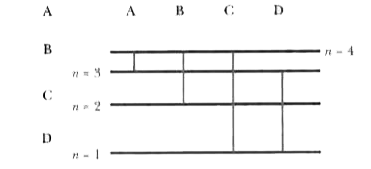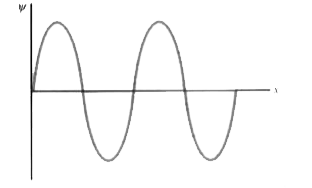Complete Solutions to PRACTICE QUESTIONS (Single Correct Choice Type) of chapter HYDROGEN ATOM of Class 12 book with complete answers and questions
| Class 12 | PHYSICS |
| Chapter | HYDROGEN ATOM |
| RESNICK AND HALLIDAY | PRACTICE QUESTIONS (Single Correct Choice Type) |
| Number Of Questions | 51 |
| Academic Year | 2023-24 |
If `lambda_(1)= and lambda_(2)` are the wavelengths of the first members of Lyman and Paschen series respectively, then ` lambda_(1): lambda_(2)`, is
View SolutionA hydrogen atom of mass m emits a photon corresponding to the fourth line of Brackett series and recoils. If R is the Rydberg's constant and h is the Planck's constant, then recoiling velocity is
View SolutionIn Bohr's model of hydrogen atom, let `PE` represents potential energy and `TE` the total energy. In going to a higher level
View SolutionIn hydrogen atom which quantity is integral multiple of `(h)/(2 pi)`
View SolutionThe ratio of longest wavelength and the shortest wavelength observed in the five spectral series of emission spectrum of hydrogen is
View SolutionWhat should be the ratio of minimum to maximum wavelength of radiation emitted by transition of an electron to ground state of Bohr's hydrogen atom ?
View SolutionThe frequency f of certain line of the Lyman series of the atomic spectrum of hydrogen satisfies the following conditions: (i) it is the sum of the frequencies of another Lyman line and a Balmer line, (ii) it is the sum of the frequencies of a Lyman line, a Balmer line and a Paschen line, (iii) it is the sum of the frequencies of a Lyman and a Paschen line but no Brackett line. To what transition does f correspond?
View SolutionThe radius of the Bohr orbit in the ground state of hydrogen atom is 0.5 Å. The radius of the orbit of the electron in the third excited state of He will be
View SolutionThe extreme wavelengths of Paschen series are
View SolutionThe wavelength or radiations emitted is `lambda_(0)` when an electron in hydrogen atom jumps from the third orbit to second. If in the H-atom itself, the electron jumps from fourth orbit to second orbit, the wavelength of emitted radiation will be
View SolutionIn hydrogen atom, if the difference in the energy of the electron in n =2 and n=3 orbits is E, the ionization energy of hydrogen atom is
View SolutionWhich of the following is true?
View SolutionAccording to Bohr's theory, the variation of perimeter(s) of the electronic orbit with the order of orbit (n) in a particular atom is
View SolutionAn excited state of H atom emits a photon of wavelength `lamda` and returns in the ground state. The principal quantum number of excited state is given by:
View SolutionIf the shortest wavelength of Lyman series of hydrogen atom is x, then the wavelength of first member of Balmer series of hydrogen atom will be
View SolutionA particle in a box has quantum states with energies `E= E_(0) n^(2)`, with n = 1, 2, 3, 4, . . . and `E_(0)` =1 eV. Which of these photons could in principle be absorbed?
View SolutionWhich of the following transitions produce the longest wavelength photon (as shown in the following figure)?

View SolutionFor a quantum particle in a box, the lowest energy quantum state has `1//2` of the particle de Broglie wave fitting in the box. The next highest state corresponds to
View SolutionAn electron is in a one-dimensional trap with zero potential energy in the interior and infinite potential energy at the walls. A graph of its wave function y(x) versus x is shown in the following figure. The value of quantum number n is

View SolutionA particle is trapped in an infinite potential energy well. It is in the state with quantum number n = 14. How many nodes does the probability density have (counting the nodes at the ends of the well)?
View SolutionA particle is confined to a one-dimensional trap by infinite potential energy walls. Of the following states, designed by the quantum number n, for which one is the probability density greatest near the center of the well?
View SolutionIn the Bohr model of hydrogen, why is the atom 9 times larger in the n = 3 state than in the ground state?
View SolutionOrbital electrons do not spiral into the nucleus because of
View SolutionBohr's model cannot explain the spectrum of neutral Lithium atoms because
View SolutionCompared to hydrogen the atom of helium has
View SolutionIf the value of Planck's constant were to increase by a factor of two, the size of a hydrogen atom would
View SolutionIn the Bohr model, if an electron moves in an orbit of greater radius
View SolutionWhich of the following statements is (are) wrong for hydrogen atom?
View SolutionThe total energy of an electron in the excited state corresponding to n =3 state is E. What is its potential energy with proper sign?
View SolutionIdentify the highest energy photons of the following
View SolutionAn atom consists of theree energy levels given by a ground state with energy `E_(0)=0`, the first excited state with energy `E_(1)=K` and the second excited state with energy `E_(2)=2K` where `K gt 0`. The atom is initially in the ground state. Light from a laser which emits photons with energy `1.5 K` is shined on the atom. Which of the following is`//`are correct?
View SolutionWhen radiation with a continuous spectrum is passed through a volume of hydrogen gas whose atoms are all in the ground state, which spectral series will be present in the resulting absorption spectrum?
View SolutionWhich of the following statement is correct in connection with hydrogen spectrum
View SolutionA hydrogen atom is excited up to 9th level. The total number of possible spectral lines emitted by the hydrogen atom is
View SolutionA hydrogen atom makes a transition from `n=2` to `n=1` and emits a photon. This photon strikes a doubly ionized lithium atom `(Z=3)` in excited state and completely removes the orbiting electron. The least quantum number for the excited stated of the ion for the process is:
View SolutionIn a sample of hydrogen-like atom all of which are in ground state, a photon beam containing photos of various energies is passed. In absorption spectrum, five dark lines, are observed. The number of bright lines in the emission spectrum will be (assume that all transitions takes place).
View SolutionAt some place in universe an atom consists of a positron revolving round an antiproton. The ratio of the wavelength of the corresponding spectral lines from this atom and ordinary hydrogen atoms is
View SolutionA hydrogen atom in its ground state absorbs 10.2 eV of energy. What is the increase in its orbital angular momentum ? S
View SolutionAn electron with kinetic energy =E eV collides with a hydrogen atom in the ground state. The collision will be elastic
View SolutionConsider the following:
(i) The probability density for an l = 0 state
(ii) The probability density for a state with l = 0
(iii) The average of the probability densities for all states in an l = 0 subshell
Of these, which are spherically symmetric?
View SolutionIf P(r) is the radial probability density for a hydrogen atom then the probability that the separation of the electron and proton is between r and r+ dr is
View SolutionWhich of the following sets of quantum number is not possible for an electron?
View SolutionWhich one of the following pairs of characteristics of light is best explained by assuming that light can be described in terms of photons?
View SolutionComplete the following statement: For the ground state of the hydrogen atom, the Bohr model correctly predicts
View SolutionWhich one of the following will result in an electron transition from the n = 4 level to the n= 7 level in a hydrogen atom?
View SolutionDetermine the wavelength of incident electromagnetic radiation required to cause an electron transition from the n = 6 to the n=8 level in a hydrogen atom.
View SolutionThe kinetic energy of the ground state electron in hydro- gen is `+13.6` eV. What is its potential energy?
View SolutionDetermine the kinetic energy of an electron that has a de Broglie wavelength equal to twice the diameter of the hydrogen atom. Assume that the hydrogen atom is a sphere of radius `5.3 xx 10^(-11)` m.
View SolutionAccording to the quantum mechanical picture of the atom, which one of the following statements is true concerning the magnitude of the angular momentum L of an electron in the n=3 level of the hydrogen atom?
View SolutionWhich quantum number is sufficient to describe the electron in hydrogen atom?
View SolutionHow many electron states (including spin states) are possible in a hydrogen atom if its energy is `-3.4` eV?
View Solution
PRACTICE QUESTIONS (Single Correct Choice Type) questions and complete solutions for chapter HYDROGEN ATOM of RESNICK AND HALLIDAY PHYSICS (HINGLISH) of Class 12